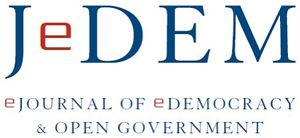Difference between revisions of "Montathar Faraon, Georg Stenberg, Mauri Kaipainen (2014) Political campaigning 2.0: The influence of online news and social networking sites on attitudes and behavior"
(Página creada con «URL:http://www.jedem.org/index.php/jedem/article/view/230 Wayback Machine: https://web.archive.org/web/20160710172439/http://www.jedem.org/index.php/jedem/article/view/230...») |
|||
| Line 1: | Line 1: | ||
| − | + | [[File: Jedem_compact.jpg | thumbnail | right]] | |
| − | + | == <small>'''Abstract'''</small> == | |
| + | This study aimed to examine differences in influence between online news (e.g., New York Times) and social networking sites (e.g., Facebook and Twitter) on attitudes in political campaigns. In a web-based experiment, campaign, polls and election between two fictitious candidates were simulated. Participants’ explicit and implicit attitudes as well as voting behavior were assessed using self-report items and the Implicit Association Test (IAT). The results reveal that information emanating from online news had a significant influence on explicit and implicit attitudes while that of social networking sites did not. Overall, negative items had a stronger impact than positive ones, more so in online news compared to social networking sites. Negative information from either type of media was more likely to change participants’ explicit attitudes in a negative direction and as a consequence also change their vote. Practical implications of the findings and limitations of the study are discussed. | ||
| − | + | == <small>'''Keywords'''</small> == | |
| − | + | online news; social networking sites; attitudes; political campaign; Implicit Association Test; Facebook; Twitter. | |
| − | + | ||
| − | + | == <small>'''File'''</small> == | |
| + | |||
| + | [[File: political-campaigning-2.0.pdf]] | ||
| + | |||
| + | == <small>'''Source'''</small> == | ||
| + | |||
| + | [http://www.jedem.org/index.php/jedem/index JeDEM - eJournal of eDemocracy and Open Government] | ||
| + | |||
| + | == <small>'''Links'''</small> == | ||
| + | |||
| + | '''URL:''' http://www.jedem.org/index.php/jedem/article/view/230 | ||
| − | + | '''Wayback Machine:''' https://web.archive.org/web/20160710172439/http://www.jedem.org/index.php/jedem/article/view/230 | |
| − | |||
| − | [[ | + | [[Category:Library]] |
| − | [[ | + | [[Category:English]] |
| − | [[ | + | [[Category:Austria]] |
| − | [[ | + | [[Category:2015]] |
| − | [[ | + | [[Category:Montathar Faraon]] |
| − | [[ | + | [[Category:Georg Stenberg]] |
| − | [[ | + | [[Category:Mauri Kaipainen]] |
| − | [[ | + | [[Category:eJournal of eDemocracy and Open Government]] |
Latest revision as of 02:52, 30 April 2017
Contents
Abstract
This study aimed to examine differences in influence between online news (e.g., New York Times) and social networking sites (e.g., Facebook and Twitter) on attitudes in political campaigns. In a web-based experiment, campaign, polls and election between two fictitious candidates were simulated. Participants’ explicit and implicit attitudes as well as voting behavior were assessed using self-report items and the Implicit Association Test (IAT). The results reveal that information emanating from online news had a significant influence on explicit and implicit attitudes while that of social networking sites did not. Overall, negative items had a stronger impact than positive ones, more so in online news compared to social networking sites. Negative information from either type of media was more likely to change participants’ explicit attitudes in a negative direction and as a consequence also change their vote. Practical implications of the findings and limitations of the study are discussed.
Keywords
online news; social networking sites; attitudes; political campaign; Implicit Association Test; Facebook; Twitter.
File
File:Political-campaigning-2.0.pdf
Source
JeDEM - eJournal of eDemocracy and Open Government
Links
URL: http://www.jedem.org/index.php/jedem/article/view/230
Wayback Machine: https://web.archive.org/web/20160710172439/http://www.jedem.org/index.php/jedem/article/view/230
